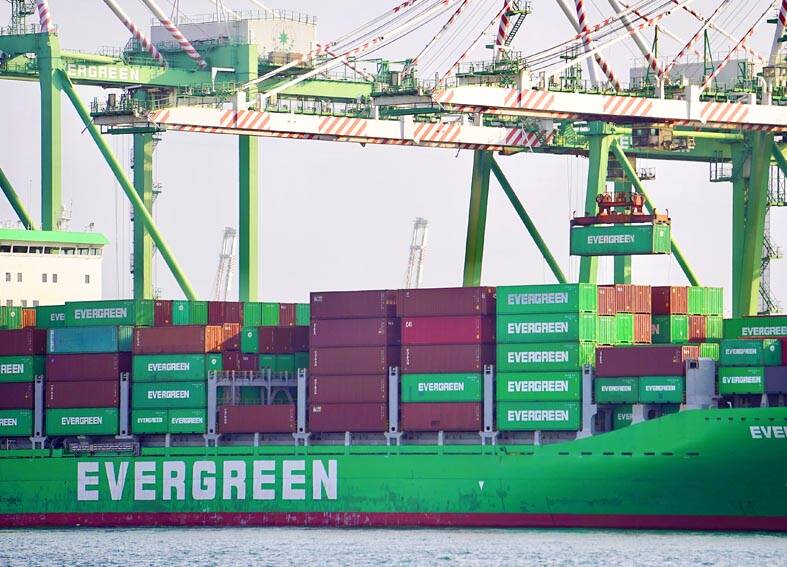Export orders last month expanded 4.8 percent year-on-year to US$50.03 billion, the greatest rise since November last year amid stronger-than-expected demand for artificial intelligence (AI) devices, high-performance computing (HPC) devices, such as servers, and inventory buildup ahead of new smartphone launches, the Ministry of Economic Affairs said yesterday.
Last month’s performance greatly exceeded the ministry’s high-end estimate of US$48.5 billion, or year-on-year growth of 1.6 percent from US$47.73 billion.
That bolstered the ministry’s confidence that export orders would expand in the second half of this year.

Photo: CNA
In the first seven months, export orders rose 2.7 percent year-on-year to US$324.89 billion.
“Last month’s performance surpassed our expectations due in part to strong demand for emerging technologies, mainly AI and HPC, which led to high demand for chips and other components,” Department of Statistics Director Huang Yu-ling (黃于玲) said via telephone. “With the arrival of the consumer electronics shopping season, customers’ inventory buildup demand also helped prop up orders.”
“Overall, we are seeing export orders move in a positive direction, with major segments swinging back to positive territory last month, except petrochemical products,” Huang said.
The ministry retained its forecast that export orders would grow sequentially each quarter during the third and fourth quarters, she said.
This month, export orders would be US$49.1 billion to US$51.1 billion, or annual growth of 6.7 percent to 11 percent, she said, attributing the uptick to AI and HPC demand.
“Taiwan is to benefit from the AI and HPC boom, as its semiconductor and server supply chains have a competitive edge over their global peers,” Huang said.
Export orders for information communication technology products last month grew 11 percent annually to US$14.13 billion, supported by robust demand for AI applications, cloud-based devices and servers, the ministry said.
Increased demand for notebook computers and graphic cards also helped, it said.
Orders for electronics rose 2.2 percent year-on-year to US$18.1 billion last month, primarily fueled by demand for AI-related applications and HPC devices, it said.
Inventory buildup at global smartphone vendors ahead of new model launches helped boost orders for chips and phones, it added.
Optoelectronics product orders expanded 7.8 percent year-on-year to US$1.78 billion last month, due mainly to increases in demand for camera lens modules and optronic inspection tools primarily from the US and the Southeast Asian countries, the ministry said.
Orders for basic metals rose 4.8 percent from a year earlier to US$2.17 billion last month, attributable to higher demand for metal products, it said.
However, the growth was offset by a decline in steel rolls and steel plates, it added.
Machine tools orders jumped 13.4 percent to US$1.67 billion last month, benefiting from semiconductor companies’ aggressive capacity expansion, resulting in higher demand for manufacturing equipment and automation systems, the ministry said.
Plastics product orders increased by 4.1 percent annually to US$1.65 billion on higher average selling prices and rising inventory restocking demand, the ministry said.
Petrochemical products orders last month shrank 0.6 percent to US$1.47 billion compared with July last year, the only segment that declined, it said, adding that the drop was due to overcapacity.
Increases in global crude oil prices helped absorb some order reductions, it said.

Taiwan Semiconductor Manufacturing Co (TSMC, 台積電) would not produce its most advanced technologies in the US next year, Minister of Economic Affairs J.W. Kuo (郭智輝) said yesterday. Kuo made the comment during an appearance at the legislature, hours after the chipmaker announced that it would invest an additional US$100 billion to expand its manufacturing operations in the US. Asked by Taiwan People’s Party Legislator-at-large Chang Chi-kai (張啟楷) if TSMC would allow its most advanced technologies, the yet-to-be-released 2-nanometer and 1.6-nanometer processes, to go to the US in the near term, Kuo denied it. TSMC recently opened its first US factory, which produces 4-nanometer

PROTECTION: The investigation, which takes aim at exporters such as Canada, Germany and Brazil, came days after Trump unveiled tariff hikes on steel and aluminum products US President Donald Trump on Saturday ordered a probe into potential tariffs on lumber imports — a move threatening to stoke trade tensions — while also pushing for a domestic supply boost. Trump signed an executive order instructing US Secretary of Commerce Howard Lutnick to begin an investigation “to determine the effects on the national security of imports of timber, lumber and their derivative products.” The study might result in new tariffs being imposed, which would pile on top of existing levies. The investigation takes aim at exporters like Canada, Germany and Brazil, with White House officials earlier accusing these economies of

Teleperformance SE, the largest call-center operator in the world, is rolling out an artificial intelligence (AI) system that softens English-speaking Indian workers’ accents in real time in a move the company claims would make them more understandable. The technology, called accent translation, coupled with background noise cancelation, is being deployed in call centers in India, where workers provide customer support to some of Teleperformance’s international clients. The company provides outsourced customer support and content moderation to global companies including Apple Inc, ByteDance Ltd’s (字節跳動) TikTok and Samsung Electronics Co Ltd. “When you have an Indian agent on the line, sometimes it’s hard

‘SACRED MOUNTAIN’: The chipmaker can form joint ventures abroad, except in China, but like other firms, it needs government approval for large investments Taiwan Semiconductor Manufacturing Co (TSMC, 台積電) needs government permission for any overseas joint ventures (JVs), but there are no restrictions on making the most advanced chips overseas other than for China, Minister of Economic Affairs J.W. Kuo (郭智輝) said yesterday. US media have said that TSMC, the world’s largest contract chipmaker and a major supplier to companies such as Apple Inc and Nvidia Corp, has been in talks for a stake in Intel Corp. Neither company has confirmed the talks, but US President Donald Trump has accused Taiwan of taking away the US’ semiconductor business and said he wants the industry back